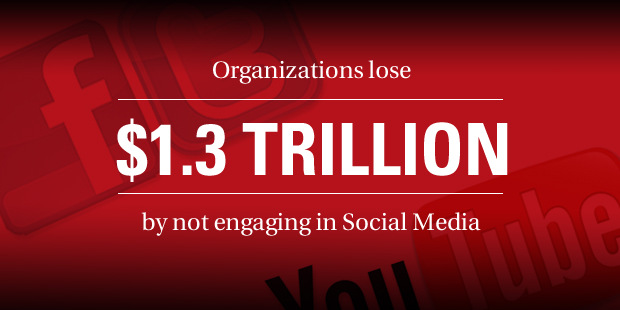
Organizations Lose $1.3 Trillion by Not Engaging in Social Media
I was shocked. Two presidents of organizations began using Twitter in the past two months. These are presidents I know well, leaders who for years saw no value in Twitter or other social media. As one told me, he had moved over to the dark side.
These leaders are not alone. Only 20 of the CEOs of Fortune 500 companies engage in Twitter. But my guess is that many of them will be moving to “the dark side” as well. The evidence is building rapidly. Your organization is at a distinct disadvantage if it does not embrace social media with enthusiasm.
A new study by the highly regarded McKinsey and Company should move even some of the deepest skeptics. Their research found that, while 72 percent of organizations use some form of social media, very few embrace it strategically. As a consequence, the productivity lost in these companies could be as high as $1.3 trillion. That’s a lot of zeros. In fact, if those dollars were the gross domestic product (GDP) of a country, its economy would be the 14thlargest in the world.
The McKinsey study notes that organizations lose both interaction within the company and connection outside the company if they do not engage social media with enthusiasm. Collaboration opportunities are lost and intimate customer connections are forfeited.
While I’m sure the organization I lead could improve greatly, we strategically embraced social media several years ago. Allow me to share four principles I have learned to this point.
1. Embracing social media begins at the top. While social media is a great equalizer, an organization will not embrace it corporately unless the leader of the organization gives his or her tacit permission. My enthusiastic involvement in social media sent a clear message that it was important for the entire organization.
2. An open attitude for the organization is worth the risk. When a large number of employees are active in social media speaking on behalf of the organization, the risks are obvious. We still encourage blogs, tweets, Facebook posts, and other social media interaction. The rewards are greater than the risks.
3. Guidelines are good, but they must not be too restrictive. We do have social medial guidelines, but we understand that too many rules go counter to the openness of social media. We feel that our balance is pretty good. We have many employees engaged in social media; and we have spoken to unwise engagement only four or five times in the past five years.
4. We often make heroes of those who engage in social media well. On many occasions, an employee has engaged in social media in such a way that we think it’s worth telling the story about what he or she did. Those stories eventually become part of the organization’s culture and, consequently, encourage others to do so as well.
Leaders and organizations will ignore social media to their own peril. Ryan Holmes, author of the article about McKinsey’s research, notes: “It seems noteworthy that the report’s conclusions have been echoed of late from the most authoritative of places: Wall Street. In the last year, the world’s largest enterprise software companies–Google, Microsoft, Salesforce, Adobe, and even Ellison’s own Oracle–have spent upward of $2.5 billion snatching up social media tools to add to their enterprise suites. Even Twitter-phobic CEOs may have a hard time ignoring that business case.”
Large corporations, small businesses, nonprofits, churches, and a plethora of other organizations are increasingly realizing the critical need for social media. Ultimately, it gets those in the organization closer to each other, as well as connecting to those whom the organization wants to reach.
The case for organizations embracing social media has been anecdotally powerful for years. But now McKinsey presents overwhelming objective data that cannot be ignored. I can only presume that many will still ignore this clear and powerful evidence. And their organizations will likely suffer as a result.
Read more from Thom here.

Tags: Attention, Awareness, Communication, Social Media, Thom Rainer












